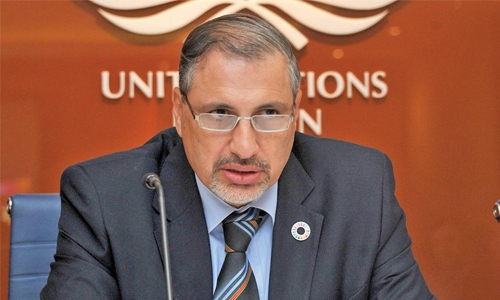UN Resident Coordinator clarifies on his comments
Manama : United Nations Resident Coordinator in Bahrain Amin El Sharkawi has made it clear that a number of articles published based on his interview on October 20 has been misinterpreted. He stated that there has been a misunderstanding about the roles of different institutions, based on which the following clarification was given.
“From Sunday, October 23, a number of articles were published based on an interview to shed light on this year’s UN Day celebrations and the importance of the Global Development Agenda and Sustainable Development Goals (SDGs).
Having reviewed the different articles, I found that there was a misunderstanding about the roles of different institutions. Some of the headings and introductions published were misleading and combined different issues erroneously. At no point did I comment on the role and functions of the High Commissioner for Human Rights although comments about the Human Rights Council have been misconstrued.
The Human Rights Council, is responsible for the Universal Periodic Review (UPR), which is an independent inter-governmental process in which all countries are treated equally during the assessment of their human rights situations. All 193 member states of the UN undertake a periodic review of their human rights status, every four years. Countries then decide on the way forward and how to address any recommendations or concerns raised.
In conformity with the UN General Assembly resolution 48/141 of 1993, the United Nations High Commissioner for Human Rights is the most senior United Nations official on all human rights related issues, in all countries. His or her public statements follow a strict and coherent methodology that entails an objective evaluation of all public reports received from various sources, including government authorities, national institutions for human rights, NGOs and relevant UN agencies.
The Office of the High Commissioner for Human Rights analyses these reports and issues observations accordingly. Amongst its responsibilities, the Office of the High Commissioner for Human Rights works to ensure the enforcement of universally-recognised human rights norms, including through promoting both the universal ratification and implementation of the major human rights treaties as well as respect for the rule of law.
In my interview, I explained that the Human Rights Council is an independent body, with no binding requirement or obligation to consult with anyone including the UN offices locally or the government in Bahrain, which was also misinterpreted.
Some recent articles published in the local media have conveyed a concern about the role of Bahrain-based UN agencies in the process of the UPR. The Human Rights Council UPR is conducted by the UPR Working Group, which is made up of 47 member states of the Human Rights Council, but can include any other UN member state. In line with the cycle of member states, the Bahrain UPR will be conducted in 2017. The previous UPR for Bahrain was undertaken in 2012.
Towards this purpose, three overarching documents are reviewed by the UPR Working Group: 1) information provided by the State under review, which can take the form of a “national report”; 2) information compiled through the reports of independent human rights experts and groups; 3) information from other stakeholders including national human rights institutions, non-governmental organisations and relevant UN entities.
At no time during my interview did I mention anything about the regular UN inter-agency consultations on different themes including on human rights. My role as Resident Coordinator is to facilitate this by ensuring proper coordination between UN agencies in Bahrain in the spirit of the “One UN” approach to support the development agenda and human rights.
In light of the interview focus on the Sustainable Development Goals and Bahrain’s commitment to them, I commended the high standards in prevalent social benefits as an excellent base from which to build towards the achievements of the SDGs, also highlighting the ongoing challenges that the country can address. For further clarification, the determination of upholding human rights standards is dealt with by the Office of the High Commissioner for Human Rights, in accordance with its mandate.
The Resident Coordinator (RC) is in fact the designated representative of the Secretary General for development operations, leading and supporting the UN Country Team in its work with national government and partners.
As outlined in the interview, the RC and UN Country Team are keen to support the Office of the High Commissioner for Human Rights (OHCHR) as well as the Bahrain Government.
Throughout my career, I have worked to fulfil the UN mandate and uphold the organisation’s values. As a UN official and Resident Coordinator in Bahrain today, neutrality, professionalism and objectivity are fundamental principles in the execution of my work.”
Related Posts

